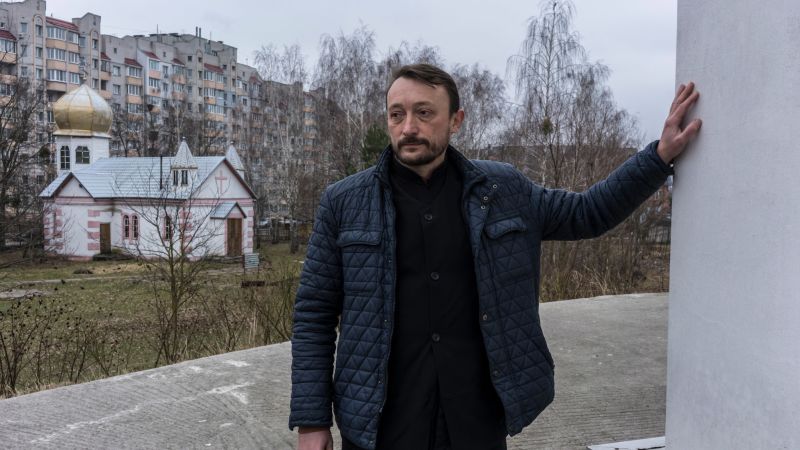Bucha, Ukraine
CNN
—
The body lay across the street from Ivan Fedorov’s house for several days. Fedorov didn’t dare to go outside, so he never found out who the dead man was. All he knows is that he was a civilian.
“He was just a passer-by who got shot,” Fedorov told CNN.
At 90, Fedorov and his wife Iryna, 84, have spent their entire married life living in the same house on Yablunska Street in Bucha, the town just north of Kyiv that has become synonymous with Russian atrocities and alleged war crimes.
Their street — named after apple trees — was where the Ukrainian army found bodies of at least 20 civilians after liberating Bucha in early April. Some had their hands tied behind their backs.
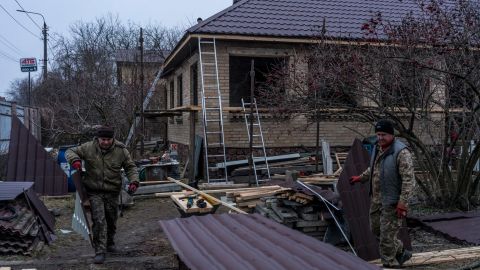
A year has passed since Russian troops rolled in and the city is trying hard to move on from the horrors it endured. There’s construction work on every corner and the clean-up operation has almost finished. The residents, however, remain scarred.
Just around the corner from the Fedorovs’ house is Vokzalna Street, where a column of Russian military vehicles got stuck during intense fighting last March.
Almost every house on Vokzalna was destroyed and most are now being rebuilt with the help of foreign donors and volunteer construction workers, who work for minimum wage, food, and lodging.
Long wooden beams have recently been delivered to multiple homes on the street; some still lie in neat piles by the roadside, others are already up on the roofs that are being restored.
Kostiantyn Momotov’s house – where the 70-year-old man has lived for almost four decades – was hit multiple times during the month-long occupation. When the Russians finally withdrew and he started clearing out the debris, he found body parts among the rubble in his yard.
“Five houses to the north of mine caught fire from the burning vehicles and ammo and their soldiers were blown to pieces. Their hands and legs and pieces were all over,” he said.
The money and the volunteers come and go, so he is prepared for the repairs to take a long time. “I have built enough in my life. Now it’s up to my grandchildren,” he said.
Efforts to clean up and rebuild Bucha started almost immediately after the town was liberated and some areas seem almost back to normal. But Father Andriy Halavin, the Orthodox priest from the town’s Church of St. Andrew, says the recovery is mostly superficial.
“When you look at [Bucha] now you may not even notice that something happened,” he said. “So, a lot of people who come to Bucha now, they won’t understand what everyone was talking about. The sky is blue, the grass is green, the birds are chirping … what war crimes are you even talking about?”
Bucha officials are trying to find ways to memorialize the events that took place there a year ago. Photographs taken in the first days after the liberation are on display in a separate hall in the church. Many are extremely graphic, depicting victims of some of the worst atrocities.
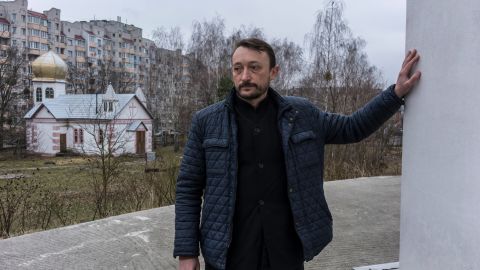
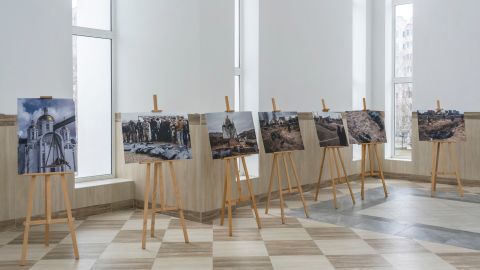
On a short stretch of scorched land by the road leading to Bucha is a graveyard of blown-up Russian tanks and burnt military vehicles. It has become something of an attraction in recent months, a place to which Ukrainians make a pilgrimage to see what victory looks like. The Bucha district authorities are now building a fence and an official entrance to the site, an attempt to make the space more “civilized.”
Father Andriy tended to his congregation throughout the darkest times. He was there when the tanks rolled in and later during the exhumations of bodies from mass graves, including one found in his own churchyard.
“It’s easier to restore the material stuff. We still don’t understand the psychological state of people. Not just Bucha residents, but all Ukrainians. Because there’s not a single family, not a single person who was able to go through all these challenges without any psychological damage,” he said.
He said each person from the community was suffering in his or her own way. And each was trying to find a way to come to terms with the past.
Tetiana Yeshchenko, 63, said she found relief in a place she’d never have expected.
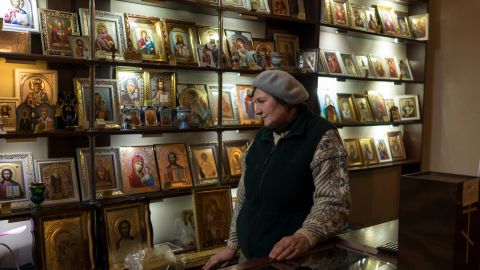
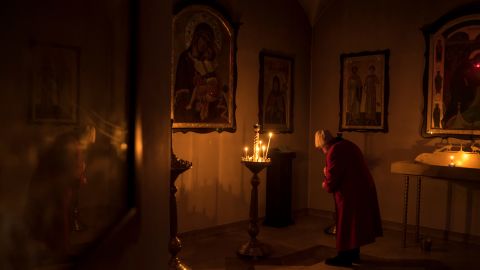
Before the war, she said, the only prayer she knew was “Our Father.” So when Russian troops took over the town and Yeshchenko decided she needed to pray, she just repeated it over and over.
“The louder the explosions, the louder I was praying,” she said. “When I heard the shooting, my knees and my hands started shaking and I started praying louder and with time the shivering would pass.”
She prayed when the Russians killed her dog and when they searched her home. She prayed when the soldiers spoke to her four-year-old granddaughter, who told them boldly that they should go away. She prayed when family members were told they could evacuate, only to be turned back when they tried.
Yeshchenko is convinced the prayers were what got her through the worst of last year. She said that after the liberation, when the immediate danger had passed and she was left with her thoughts, she descended into a deep depression; at this point, she turned to praying again.
A year ago, Yeshchenko rarely went to church and didn’t consider religion a big part of her life. Now she spends her days working alongside Father Andriy at St. Andrew’s. She sells candles, rosaries, and icons framed in gold, and patiently speaks to visiting delegations about the impacts of the war.
She continues praying — including for her recently mobilized son who is currently fighting in Bakhmut, in eastern Ukraine. “Working here helps. And praying. I come home and read ‘Our Father’ 40 times,” she said.
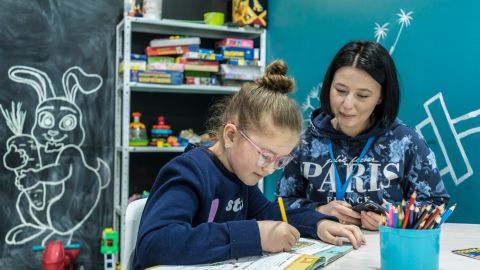
Before Bucha became synonymous with unimaginable war crimes, it was a quiet, leafy place, the kind of green suburb with good schools where young families aspire to live.
For 31-year-old Nastia Mykolaietz and her husband, that aspiration became reality just four months before the war started. They bought an apartment in Bucha, right next to the modern Epicentr shopping mall. They moved in and started renovating the bathroom. They were enjoying their new life.
The idyll didn’t last long. On February 24, the family was woken up at 5 a.m. by Mykolaietz’s mother, who called to urge them to leave immediately. They grabbed a few things — some clothes, a laptop and a potty for the little one — and ran. The plan was to take the kids to safety as quickly as possible, then return for more clothes and their cat, called Lisa. But they never made it back that day. Fighting in the area became too intense.
They returned 47 days later, expecting to find their apartment destroyed and the cat dead.
“We arrived and she was there, completely bald and skinny, but alive,” Mykolaietz said. “She ate from the trash. The frozen berries in my fridge melted and that was the puddle she was drinking from. She was covered in berries.”
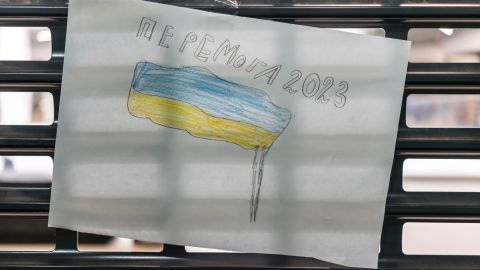
Returning was difficult for the family. The mall next to their home had been completely destroyed, shops were closed and supplies hard to find.
Mykolaietz went to a Unicef help-point to see if she could get a doctor’s consultation for her five-year-old son. After a few visits to the center, Mykolaietz, a former kindergarten teacher, found out there was a vacancy as a carer for children and took the job. Now she spends her days with local children, many of them deeply traumatized by the events of last year.
“My son is still scared of the noise of the airplane,” she said. “Today he woke up, he took his mask, his toy gun and said, ‘This is my checkpoint, and I will defend it.’”
Lego is by far the most popular toy at the play center. The kids like building guns, military cars and battleships. In the playground, “air raid” is the favorite game.
“They run around playing and screaming ‘Air raid, everyone go to shelters!’” Mykolaietz said.
Iryna and Ivan Fedorov stayed in Bucha throughout the occupation, even as they sent their children and grandchildren away. They hunkered down with Iryna’s disabled sister and their next-door neighbor, who suffered a broken arm when a missile hit her house.
“We were cooking food outdoors, in our yard, on the fire. I’m cooking and something is flying over my head and whistling. But come what may, we thought,” Iryna said.
They didn’t hide during the shelling, saying they didn’t see the point.
“Where would we hide? In the house? Then we would be under the rubble and no one would even find us. At least if it happens in the yard, people passing by might notice the bodies lying in the yard,” Iryna said.
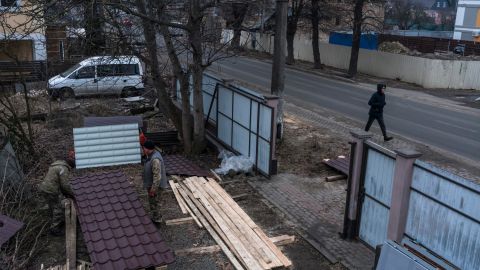
The couple survived, but many did not. More than a thousand civilians were killed in Bucha and the surrounding region during the occupation, according to Kyiv region police.
International investigators from the Organization for Security and Cooperation in Europe concluded that the atrocities committed by Russian troops in Bucha amounted to crimes against humanity and said there was “credible evidence” suggesting violations of “even the most fundamental human rights.” The experts said that photographic and video evidence “appear to show that Russian forces carried out targeted, organized killings of civilians in Bucha.”
The Russian government has consistently denied the accusations and claimed the images were “a hoax.”
Father Andriy said nearly everyone in town knows someone who died.
To the world, these people are known as the “Bucha bodies,” he said. “For us, these are our relatives, our friends, people we know.”
Not far from his church, six burnt bodies were found after the liberation.
“For journalists, these are just the burnt remains. But for us, this was a family of a singer, who used to sing in our church. He had sung here for many years. How can we ever forget this? We have to talk about this. This is our pain,” he said.

